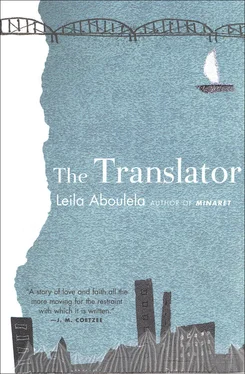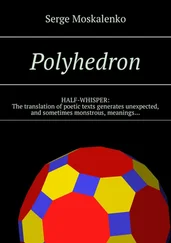‘People understand it but in the context of its own place, its own part of the world. Here though, it’s a different story. I would think that the consensus is “in Rome do as the Romans do”.’
‘Typical imperialist thinking.’
‘You’re right,’ he said, ‘but these things take time to change. Not in our lifetime, I don’t think.’
‘In your lifetime,’ said Yasmin. ‘We’re young, aren’t we Sammar?’
Sammar turned around. Her hands were wet with soap and she held them above the sink. ‘You’re younger than me,’ she said to Yasmin.
‘I’m going to be thirty next week,’ said Yasmin. ‘My birthday and Nazim will be away as usual.’
‘He’s still off-shore?’ asked Rae.
‘Off Shetland, freezing away, poor thing. But it is so peaceful without him.’
‘You say things you don’t mean, Yasmin,’ said Sammar. She turned off the taps and wiped the basin with the wash cloth. There were stains around the plug and in between the taps.
‘Chekhov wrote,’ said Rae, ‘that a woman pines when she is deprived of the company of a man and when deprived of the company of a woman, a man becomes stupid.’
‘Rubbish,’ said Yasmin. ‘I never pine.’
Sammar looked around for a towel to wipe her hands. The towel she found hanging on the back of a chair had a picture of a dolphin on it. The cat was nowhere in sight. It had gone outside and it was time for them to leave too. ‘We should go, shouldn’t we?’ she said to Yasmin when she joined them, ‘It’s getting late.’
‘I’m so tired I can’t move,’ Yasmin said and Sammar had to hold both her hands and pull her up.
‘What are you going to be like in a few months’ time?’ she teased her, and they were laughing when Rae opened the front door and walked with them down the steps.
Outside, Sammar stepped into a hallucination in which the world had swung around. Home had come here. Its dimly lit streets, its sky and the feel of home had come here and balanced just for her. She saw the sky cloudless with too many stars, imagined the night warm, warmer than indoors. She smelled dust and heard the barking of stray dogs among the street’s rubble and pot-holes. A bicycle bell tinkled, frogs croaked, the muezzin coughed into the microphone and began the azan for the Isha prayer. But this was Scotland and the reality left her dulled, unsure of herself. This had happened before but not for so long, not so deeply. Sometimes the shadows in a dark room would remind her of the power cuts at home or she would mistake the gurgle of the central-heating pipes for a distant azan. But she had never stepped into a vision before, home had never come here before. It took time to take in the perfect neatness of the buildings and the gleaming road. It took time for the heating in Yasmin’s car to clear the mist of their breath on the window panes.
They drove through streets bright with lamplight, full of cars. Young people strolled along Union Street as if they did not feel the cold. Saturday night, another world.
‘Rae is different,’ Sammar said. Her voice made it sound like a question.
‘In what way?’
‘He’s sort of familiar, like people from back home.’
‘He’s an orientalist. It’s an occupational hazard.’
Sammar did not like the word orientalist. Orientalists were bad people who distorted the image of the Arabs and Islam. Something from school history or literature, she could not remember. Maybe modern orientalists were different. Her eyesight was becoming blurred. She felt tired, deflated. The headlights of the cars were too bright, round savage circles crossed by swords.
‘Do you think he could one day convert?’ Mirages shimmered on the asphalt.
Yasmin snorted. ‘That would be professional suicide.’
‘Why?’
‘Because no one will take him seriously after that. What would he be? Another ex-hippy gone off to join some weird cult. Worse than a weird cult, the religion of terrorists and fanatics. That’s how it would be seen. He’s got enough critics as it is: those who think he is too liberal, those who would even accuse him of being a traitor just by telling the truth about another culture.’
‘A traitor to what?’
‘To the West. You know, the idea that West is best.’
‘But you can never tell about people,’ said Sammar. ‘Look at this uncle of his…’
‘Are you hoping he would convert so you could marry him?’
‘Don’t be silly, I was just wondering.’ She breathed in and out as if it was an effort. Her eyes ached, her nose ached. ‘I was just wondering because he knows so much about Islam…’
‘This annoys him.’
‘What annoys him?’
‘That Muslims expect him to convert just because he knows so much about Islam.’
They had reached Sammar’s place by then. She could hardly open her eyes to put the key in the lock, light was a source of suffering. And a headache, pain greater than childbirth. Inside, she wanted to hit her head against something to dislodge what was inside. Sleep, which came so easily in this hospital room, in layers and hours, would not come now. The silence, the absence of pain would not come. Ya Allah, Ya Arham El-Rahimeen. When sleep finally came it was desperate unconsciousness. She woke up clear, weightless, full of calm. She thought she must have had something between a migraine and a fit.
Others walked in the Winter Gardens now. Mid-morning and families were calling out to each other, strolling among the flowers and green plants. A boy ran past Sammar and Rae, holding a red packet of crisps, the arms of his jacket tied round his waist. Her son would be the same age now as this boy. No longer curved like a baby, no longer learning how to talk. A schoolboy. Mahasen had written to her and said, schools here are not what they used to be, you must come and take him back, it would be better for him. Her aunt’s letter arrived when the city was covered in fog (even the postman still made his rounds unperturbed in the dark). A year later and Sammar was still paralysed, unresponsive to her son. Froth, ugly froth.
She could not forget what her aunt had said to her, that night when they quarrelled about Ahmad Ali Yasseen, an old family friend. Nine months have not yet passed, you want to get married again… and to whom? A semi-illiterate with two wives and children your age. I’ll never give permission for something like this. From what sort of clay have you been made of? Explain to me. Explain what you think you’re going to do … Throughout her childhood, ‘Am Ahmad had come to visit from the south. A roll of dust behind his Toyota van, crates of mangoes, straps of sugar cane. He laughed happiness.
Sammar always remembered him as laughing, except the time he cried for Tarig, his stomach shaking underneath his white jellabia the same way it did when he laughed. Doctor. He called Tarig ‘doctor’ even when Tarig was sixteen and waiting for his exam results.
Tarig, Rae had asked about Tarig. There was Ethiopian blood in his family, in the copper hint to his skin, the shape of his nose. Studying for exams, so many exams to become a doctor. Tarig doodling music on his notes. They came to Aberdeen for more exams. Part One, Part Two. Exams that never ended. Cultureshocked they were alone together for the first time. No Mahasen, no Hanan. No one in this new city but them. They had dreamed of this, talked of this. Yet like the elderly who remember the distant past more clearly than the events of the previous day, Sammar lived with a young Tarig inside her head.
‘When he was fourteen,’ she said to Rae, ‘Tarig broke his leg. He fell off a ladder while he was trying to hang up a poster in his room. The ladder fell too. It made a terrible bang which woke Mahasen from her afternoon nap. She came rushing into the room and beat him with her slipper for being careless and for waking her up. I was laughing at him, I couldn’t help it. I covered my mouth knowing it was wrong to laugh when grown-ups were angry. But I couldn’t stop myself. He looked so funny tangled up with the ladder, fending off Mahasen’s slipper. It was a good thing she did not see me laughing or else she would have turned on me too.’
Читать дальше












